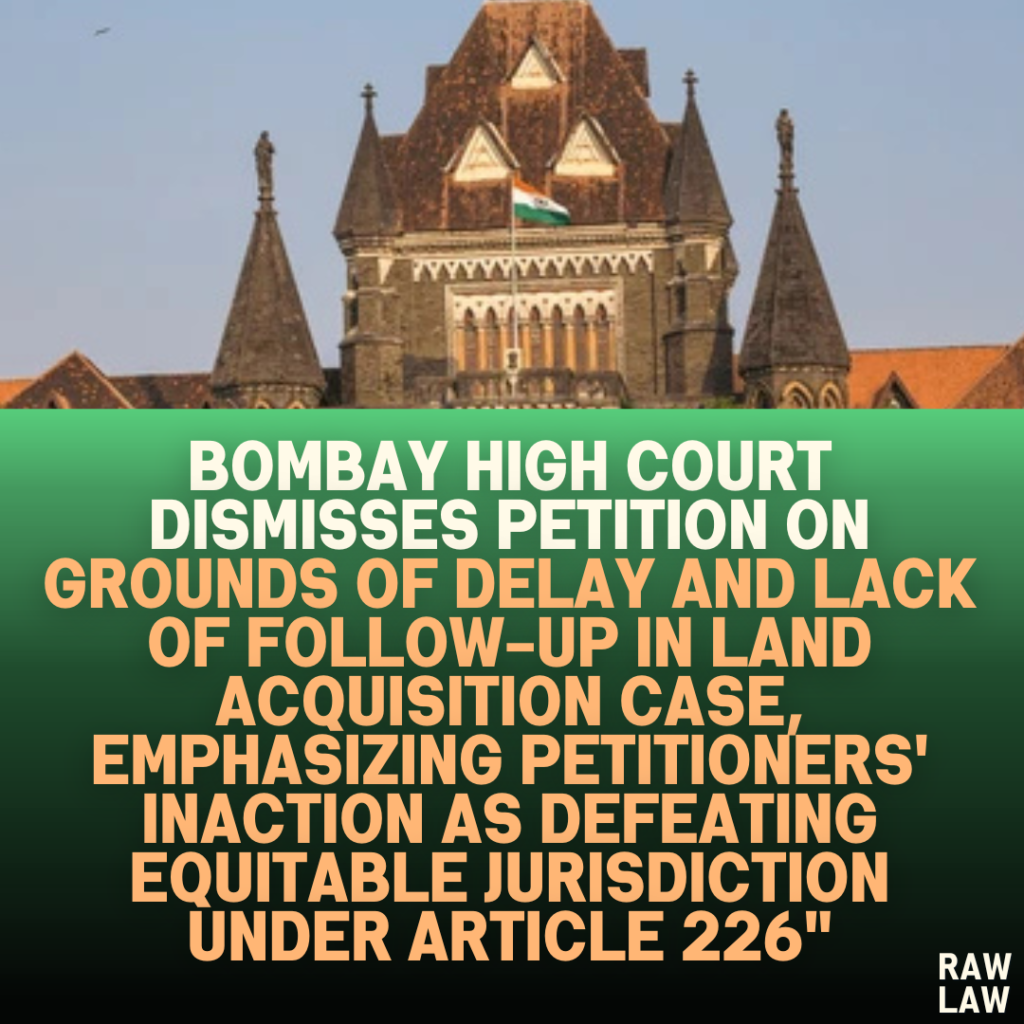Court’s Decision: The Bombay High Court dismissed the petition, observing that the petitioners failed to pursue the case with due diligence for over a decade. The Court held that no plausible explanation was provided for the delay in filing the petition, making it inappropriate to exercise its equitable jurisdiction under Article 226 of the Constitution.
Facts of the Case: The petitioners challenged an order passed in 2006 by the Divisional Commissioner, Pune, upholding the acquisition of their land for resettling project-affected persons related to the Warna irrigation project. They alleged that the land acquisition was based on a flawed calculation of agricultural land owned by them. Although they previously litigated the case up to the Supreme Court, securing a remand order for reassessment, they took no further action for 13 years until filing the present petition in 2018.
The petitioners cited the Right to Fair Compensation and Transparency in Land Acquisition, Rehabilitation and Resettlement Act, 2013, contending that the acquisition had lapsed, a claim they later abandoned following the Supreme Court’s ruling in Indore Development Authority v. Manoharlal.
Issues:
- Whether the acquisition of the petitioners’ land was illegal due to incorrect computation of landholding.
- Whether the petitioners’ delay in pursuing the case warranted dismissal on grounds of laches and lack of diligence.
Petitioner’s Arguments: The petitioners argued that the acquisition was based on incorrect landholding calculations and that their land was not within the project’s benefited area, making the acquisition inapplicable. They maintained that they were under the impression that the Supreme Court’s status quo order from 1998 sufficed to protect their rights.
Respondent’s Arguments: The State countered that the entire land was owned by the petitioners’ grandfather at the time of the acquisition and met the threshold for acquisition under the Resettlement Act. It argued that the petitioners’ claims were belated and that they provided no documentary evidence of follow-up action after the personal hearing in 2005. The State had taken possession of the land in 1988, and the petitioners had refused compensation under the award.
Analysis of the Law: The Court referenced the Supreme Court’s ruling in Indore Development Authority v. Manoharlal, clarifying that both compensation and possession must be unmet for an acquisition to lapse under Section 24(2) of the 2013 Act. Given that the State had taken possession, the Court found the petitioners’ reliance on Section 24(2) to be untenable. The Court also emphasized the principles of laches, highlighting that the writ jurisdiction under Article 226 should not support delayed and stale claims.
Precedent Analysis: The Court cited cases such as State of MP v. Nandlal Jaiswal and C. Jacob v. Director of Geology & Mining, stressing that equitable relief under writ jurisdiction should not revive stale claims or claims lacking timely follow-up. It underscored that even fundamental rights might not invoke writ jurisdiction if pursued indolently.
Court’s Reasoning: The Court reasoned that the petitioners’ prolonged inaction contradicted the conduct expected of diligent litigants, especially given their previous litigation history. It found the petitioners’ reliance on the status quo order as a basis for inaction indefensible and observed that any reasonable litigant would have followed up after the Supreme Court’s remand order.
Conclusion: The High Court refused to grant any relief, concluding that the petitioners’ delay and lack of follow-up disqualified them from equitable relief under Article 226. It discharged the rule and dismissed the writ petition without costs.
Implications: This judgment underscores the necessity for litigants to diligently pursue legal remedies and follow up on proceedings to avoid forfeiting their rights due to delay. The Court’s reliance on principles of laches serves as a caution against attempting to revive stale claims through equitable jurisdiction, especially in cases involving land acquisition.




Pingback: Delhi High Court Dismisses Union of India's Appeal, Affirms Armed Forces Tribunal’s Order Granting Disability Pension for Service-Related Schizophrenia, Citing No Jurisdictional Error - Raw Law